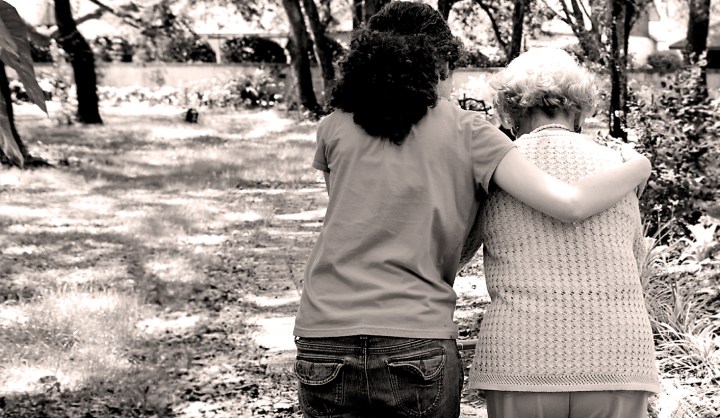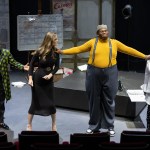Maverick Life
When the heart still sings: Can music unlock communication with dementia patients?

There’s no coming back from dementia. But increasingly, music therapy is being used to decrease the isolation experienced by these patients. Emotionally, it’s a strong trigger. And neurologically, it taps into parts of the brain that can still be accessed. By MARELISE VAN DER MERWE.
So often, the elderly become the forgotten: Daily Maverick earlier reported that it’s extremely difficult to get funding for care of the elderly, as philanthropy tends to focus on youth and children, and too often, elder abuse slips under the radar. (Just this week, a horror story broke of gruesome abuse in an upmarket frail care centre in South Africa.) Loneliness and vulnerability are significant problems of ageing, but for those with dementia, the isolation is unfathomable.
Dementia* is a one-way street. But for patients, there is a glimmer of hope in terms of quality of life: music therapy.
Before you roll your eyes and imagine the worst, hold up a second: Music therapy for patients with dementia is a growing field – a slowly-growing, under-resourced field, but a growing field nonetheless. And there are sound, scientific reasons for why it works.
It has long been known that regular stimulation can slow the progression of dementia or delay its onset. But in recent years, the specific type of stimulation received through music is being recognised for the role it plays in providing both emotional relief to patients with dementia, and giving a type of stimulation not easily provided otherwise.
The documentary Alive Inside, which has won two Audience Awards, a Best Documentary Award and several other awards at over seven film festivals including the Sundance Festival, premieres at the Labia in Cape Town on Sunday 10 May. It features the journey of social worker Dan Cohen, who travels through a number of frail care facilities in the US, documenting the effects of music on patients with Alzheimer’s and other forms of dementia. Not just any music, mind you, but music that has a specific emotional significance for them.
Alive Inside tends to sentimentalise at times, which is a pity, because its message is sound. Essentially, the take-home is that music can be used to unlock a response from patients with even advanced dementia, but not just any music – music that is significant to them. For religious patients, such as Gladys Wilson (see video below), the greatest response was achieved through hymns she had loved. The same applied to Henry (also in clip below), who responded to both hymns and to favourite songs from his youth.
Neurologist Dr Oliver Sacks notes in the film that music stimulates the parts of the brain that are typically affected last by dementia, so music therapy can in fact provide stimulation to even patients who are in an advanced stage of illness and unresponsive to other stimuli. In this way, music therapy allows both therapists and loved ones to access patients who may not be able to communicate in any other way.
Watch: Alive Inside – Henry Dreyer
The problem, unfortunately, is that not a great deal of funding is available for geriatric care, and it is also not a field that specialists are lining up to study. Alive Inside gravely makes note of the US shortage of geriatricians (a few thousand) – tellingly, when Daily Maverick enquired of a local specialist as to the South African status, we were informed that there were, at present, eight in the country.
Watch Alive Inside:
Nonetheless, music therapy for elders with dementia is a growing field locally too, says occupational therapist Karyn Stuart, who has specialised as a music therapist and began her career as part of a neurology rehabilitation multi-disciplinary team working with the elderly in under-resourced communities. Stuart runs music therapy groups for those with dementia at various old age and frail care facilities in Cape Town.
“I’ve seen how those who are really isolated and quite lost within themselves come alive in a music therapy sessions and experience reconnection with those around them,” she says.
It’s important to realise, however, that it’s not sentimental, airy-fairy mumbo-jumbo. Alive Inside does tend to take this route a little, but it does its subject a disservice by doing so: there is, in fact, sound science behind the success of music therapy on dementia patients.
Neurologist Dr James Butler pointed Daily Maverick in the direction of a study by Narme, Clement et al on the efficacy of music therapy for patients with Alzheimer’s. The study found that a series of music-based interventions caused “positive changes in the patients’ emotional state and decreased the severity of their behavioural disorders, as well as reduced caregiver distress”. Although there was no cognitive improvement in the patients – in other words, the effects of the disease on brain function could not be reversed – there was a definite improvement in patients’ wellbeing and that of their caregivers and it had a positive impact on their interactions.
It’s important to note, though, that the study encompassed a series of interventions using both music and cooking – and that the researchers noted at the end that the results were more effective when tailored to the individuals’ preferences. It is therefore possible that more than one kind of therapeutic or creative outlet, or stimulation, could be effective.
Music, however, has the advantage in that it is accessible and, in many ways, universal.
“Music in itself is therapeutic and has a tangible effect on the brain anatomy and functioning,” says Stuart. “It stimulates almost all regions of the brain including the memory and emotion centres; it affects our bodies on a physiological level by increasing our dopamine and serotonin levels (our feel-good hormones), it impacts our heart rate and blood pressure and even has an impact on our immune system.
“Certainly on an emotional level, music impacts our mood, it can energise or calm us, it can bring back memories, it can inspire us, it can sadden us. This is why it’s put to good use in movies as it helps create the feeling or emotional reaction of the audience. There have also been many research studies overseas that have documented the impact of music on agitation and frustration levels, which has led to a decrease in the need for pharmacological interventions, as the person with dementia no longer needs as much medication to remain calm.”
But, she says, this is one aspect of the therapy: it also facilitates communication with the patient so that they can communicate and be less isolated, as well as becoming more physically active. “Music therapy takes this a step further and makes clinical use of music and sounds through active music making (singing and playing instruments), improvisation, movement to music, listening to music in order to reach certain non-musical goals within a therapy process,” says Stuart. “For example, to help the person with dementia reconnect with their identity and feel ‘able’; to help them connect socially with those around them; to assist in communication and provide a space for expressing and coping with emotions like sadness, loss, frustration. Music is a familiar activity to most people so music therapy groups are non-threatening and pleasurable.”
Family and friends can certainly use music at home to stimulate loved ones and help reconnect with them, says Stuart, but it’s important to realise that one can’t just “do” music therapy. “Music therapy is a very specific discipline that requires training,” she says.
Watch: Gladys Wilson and Naomi Feil
Nonetheless, there’s at least one voluntary programme that’s sprung up. In South Africa, pharmacist Celeste Naude is attempting to launch a similar project to that of Cohen; that is, informally to use music simply to bring a little more joy to patients with dementia. She has identified a patient base and has had a positive response from a number of frail care centres, but is still in the process of securing permission to document the process to produce a similar record to that captured in Alive Inside.
Naude is not trained as a music therapist, but has been volunteering in much the same way Cohen has, monitoring the response of patients with dementia – mostly Alzheimer’s patients – to music that they loved. Naude, like Cohen, has found that overwhelmingly, patients responded much more strongly to music that had a strong emotional or personal significance for them.
“According to Jill Robson from Alzheimer’s South Africa, it has not been done formally in South Africa at all,” she says. “With this project, we are hoping to add value to our elderly dementia and Alzheimer patiients on a voluntary basis, but also document findings specific to South Africa within the current infrastructure.”
Naude points out that in South Africa, there is a distinct lack of awareness around dementia and its treatment, and that many patients – because our healthcare system is so under-resourced and because clinics are so inaccessible to so many – it is virtually impossible to track how well-managed the condition is in South Africa. One can monitor how many pills are dispensed and how many doctors are visited, but there is no way to see who slips under the radar. “The information becomes very scant,” she says.
One of the things that makes her determined to formalise a volunteer programme similar to that portrayed in Alive Inside is that there is such poor infrastructure in South Africa, says Naude. “It makes South Africa unique in many ways,” she says. “There are no official dementia plans, policies and strategies in place, yet there are organisations throughout South Africa, trying their utmost to make a difference.There is not an official policy for Alzheimer’s. There are organisations all over the place, trying their utmost.
“This project, to me, is a worthy effort for those who are often forgotten,” she says. DM
* According to the Mayo Clinic, Alzheimer’s accounts for approximately 60 – 70% of cases of dementia, although there are several other illnesses that cause dementia as well.
Alive Inside is screening at the Labia Theatre in Cape Town at 6.15pm on Sunday 10 May.
For more information on music therapy visit Stuart’s website or the South African Music Therapy Association.
Photo by Rosie O’Beirne.

















 Become an Insider
Become an Insider